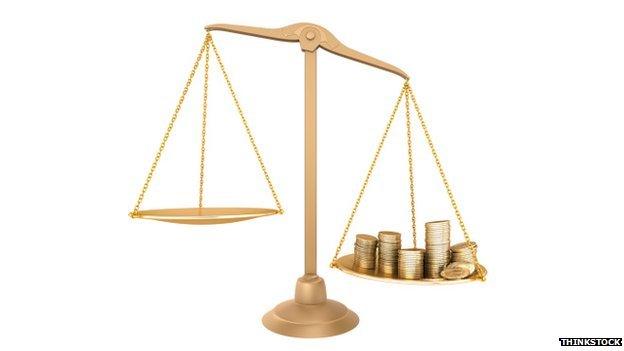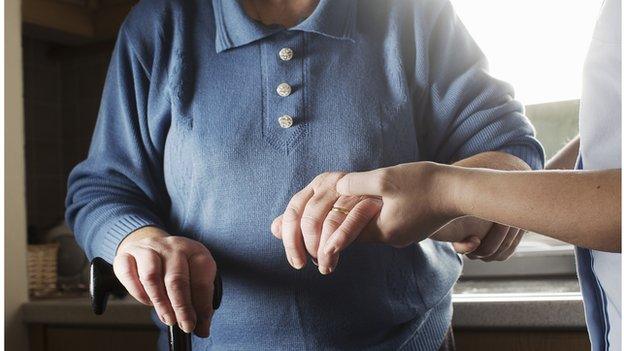Why the care sector is green with envy
- Published
- comments

It has been enough to make those involved with social care green with envy. For the past year or so the NHS in England has been making the case that it is short of money.
So what happens? Chancellor George Osborne throws another £2bn its way to top up its £100bn-plus budget. Social care has been putting the case for even longer, but it was left empty handed by the Autumn Statement.
The reaction in the sector was telling. Caroline Abrahams, of Age UK, called it "morally indefensible, while Richard Hawkes, of the Care and Support Alliance, said the decision was a "false economy".
Do they have a case? In an era when money is so tight, there are plenty of areas that could argue they deserve more funds. But there is evidence - some would say pretty compelling - to suggest the world of care has a point.
While the NHS has seen its budget rise in real terms - once inflation is taken into account - the opposite has happened for council-run social care.
A total of £17.23bn was spent on services for the elderly and disabled last year - down by 3% in five years. It has meant the numbers getting help have been falling - down by 29% to 1.27m during the same period.
This, remember, is at a time when you would expect it to be increasing in light of the ageing population and the fact that people with disabilities are living for longer.
What makes this particularly frustrating for social care is that the two sectors are often referred to as two sides of the same coin. Cuts to social care have a knock-on effect of funds on the NHS - as the rising number of hospital admissions and increasing delays discharging patients shows.
To be fair, the government has recognised this. Next year the Better Care Fund will be launched to encourage greater working between the two sectors.
A total of £3.8bn for 2015-16 has been set aside by ministers - most of which is coming from the NHS. This is being topped up to £5.3bn from local budgets.
But there is real doubt in the sector about how effective this money will be. This pot includes nearly £2m of money that is already being used for this purpose, but as the falling numbers getting care suggests this has not had a radical impact yet.
In the past few weeks there have been two major reports that have provided even greater evidence of what is happening up-and-down the country.

First, a joint review by the Independent Age charity and Strategic Society Centre think-tank warned the squeeze on funding had left many struggling to get by without help.
It only looked at older people - nearly half of people who get help from councils are working-age people with disabilities.
The report said there were 2m people with significant care needs. A quarter - 560,000 - have what could be called severe needs. These are the people who have the greatest problems washing, dressing and feeding themselves - effectively the sort of people who should qualify for help.
But 160,000 receive inadequate help, while another 70,000 have none at all, the report said.
And it is not just the people who need care that appear to be suffering. Earlier this month a review led by former care minister Paul Burstow looked at the working conditions of staff providing care in people's homes.
It did not mince its words, saying the 685,000 people working in the sector were effectively being "exploited". Many were only paid for the contact time they had with their clients, not for travelling in between visits. The effect was that a third of workers were being paid less than the minimum wage.
What is more, about 60% were on zero-hours contracts. Unsurprisingly, the employment practices were not conducive to a stable workforce - a fifth of staff left their jobs each year.
That has an impact on the vulnerable people who need the care. The review heard reports of people seeing up to 50 different carers a year.
These, of course, are reviews that were set up to identify problems so it should come as no surprise they have. But think of it like this: what sort of outrage would there be if nurses were paid less than £6.50 an hour or you never got to see the same GP?